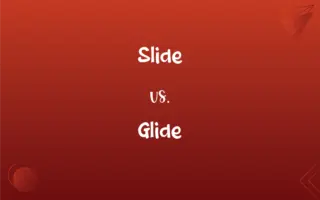Her vs. Him: What's the Difference?
Edited by Aimie Carlson || By Janet White || Published on October 27, 2023
"Her" is a feminine pronoun, while "Him" is a masculine pronoun.

Key Differences
"Her" and "Him" are both personal pronouns in the English language. "Her" is specifically used as a possessive determiner, referring to something that belongs to a female, and also as an object pronoun for a female. On the other hand, "Him" is solely used as an object pronoun for a male. Both words represent gender-specific entities or persons, with "Her" focusing on the female aspect and "Him" on the male.
Usage of "Her" and "Him" is essential in sentences to provide clarity. If we were talking about a book that belongs to a female, we would say, "This is her book." Conversely, if we're discussing a male being given something, we'd state, "I gave it to him." Both "Her" and "Him" serve the purpose of establishing a clear subject or ownership in context.
In terms of position in a sentence, "Her" can act both as an object pronoun and a possessive determiner. For instance, "I spoke to her" (object pronoun) and "Her coat is blue" (possessive determiner). "Him", however, only takes on the role of an object pronoun, as in "She called him."
When learning English, understanding the distinction between "Her" and "Him" is pivotal. Since "Her" can serve two functions and "Him" only one, learners need to be cautious about their application. Both "Her" and "Him" are integral in daily conversations, making it crucial to master their proper use.
In the broader scope of linguistics, "Her" and "Him" contribute to the gendered nature of the English language. While both words are gender-specific, they each cater to different genders, with "Her" for females and "Him" for males. This distinction is mirrored in many other languages, where gender plays a role in the grammatical structure.
ADVERTISEMENT
Comparison Chart
Gender
Feminine
Masculine
Pronoun Type
Object pronoun & possessive determiner
Object pronoun
Example (Object)
"I saw her at the park."
"I saw him at the park."
Example (Possessive)
"Her book is on the table."
N/A
Usage Frequency
Used more often due to dual function
Used specifically as object pronoun
ADVERTISEMENT
Her and Him Definitions
Her
Feminine object pronoun.
I gave the book to her.
Him
Referring to a male person or animal.
Him being the leader, he decided.
Her
Denoting a female reference in context.
The cat hurt her paw.
Him
Masculine object pronoun.
I gave the book to him.
Her
Feminine possessive determiner.
Her coat is new.
Him
Indicating a relation to a male entity.
I'll meet him tomorrow.
Her
Indicating ownership or relation to a female entity.
Her sister is coming today.
Him
Used to emphasize the male person.
Him? He's the manager.
Her
Used as a modifier before a noun
Her boots.
Her accomplishments.
Him
Denoting a male reference in context.
The dog followed him home.
Her
A female
The dog is a her. See Usage Notes at be, I1.
Him
A male
The dog is a him.
Her
Belonging to her (belonging to that female, or in poetic or old-fashioned language that ship, city, season, etc).
This is her book
Him
A masculine pronoun; he as a grammatical object.
Her
Belonging to a person of unspecified gender to counterbalance the traditional "his" in this sense.
Him
With dative effect or as an indirect object.
Her
The form of she used after a preposition, as the object of a verb, or (deprecated) with a conjunction; that woman, that ship, etc.
Give it to her
He wrote her a letter
He treated her for a cold
Him and her went for a walk
Him
Following a preposition.
Her
(informal) A female person or animal.
I think this bird is a him, but it may be a her.
Him
With accusative effect or as a direct object.
Her
The form of the objective and the possessive case of the personal pronoun she; as, I saw her with her purse out.
Him
Used reflexively: (to) himself.
Her
Of them; their.
On here bare knees adown they fall.
Him
With nominative effect: he, especially as a predicate after be, or following a preposition.
Her
Referring to a female person or animal.
Her name is Sarah.
Him
Alternative case form of Him
Him
(informal) A male person or animal.
I think this bird is a him, but it may be a her.
Him
Them. See Hem.
Him
The objective case of he. See He.
Him that is weak in the faith receive.
Friends who have given him the most sympathy.
I never saw but Humphrey, duke of Gloster,Did bear him like a noble gentleman.
FAQs
Can "Her" be used as both object pronoun and possessive determiner?
Yes, "Her" can function in both roles.
What is the gender reference for "Her"?
"Her" refers to the feminine gender.
How do I differentiate between "Her" as an object and as a determiner?
In sentences like "I told her" it's an object. In "Her book", it's a determiner.
Is the same true for "Him"?
Yes, "Him" can refer to non-human entities perceived as male.
And for "Him"?
"Him" refers to the masculine gender.
Can "Him" be placed at the beginning of a sentence for emphasis?
Yes, e.g., "Him being the expert, we listened."
Can "Him" be used as a possessive determiner?
No, "Him" is solely an object pronoun.
Why is gender distinction important in English?
It adds clarity and specificity to sentences.
Do other languages have equivalents to "Her" and "Him"?
Yes, many languages have gendered pronouns.
Can "Her" and "Him" be used interchangeably?
No, they cater to different genders and functions.
Are "Her" and "Him" subject pronouns?
No, "She" is the subject pronoun for "Her", and "He" for "Him".
Is "Her" the opposite of "His"?
Not exactly. "Her" can be equivalent to "Him" or "His" depending on context.
Can "Her" refer to non-human entities?
Yes, if the entity is perceived or referred to as female.
Is it ever grammatically correct to use "Him" as a subject?
No, "He" is the correct subject pronoun.
Is "Her" always followed by a noun?
Not always. It is when used as a determiner, but not as an object pronoun.
Are there neutral alternatives to "Her" and "Him"?
Yes, "Them" can be used as a neutral singular pronoun.
Is it correct to say "book of him" instead of "his book"?
No, the correct possessive pronoun for masculine is "his".
Can "Her" start a sentence similarly?
Yes, e.g., "Her being the doctor, she knew best."
In what scenarios might "Him" be preferred over "He"?
When the male is the object, like "I saw him."
About Author
Written by
Janet WhiteJanet White has been an esteemed writer and blogger for Difference Wiki. Holding a Master's degree in Science and Medical Journalism from the prestigious Boston University, she has consistently demonstrated her expertise and passion for her field. When she's not immersed in her work, Janet relishes her time exercising, delving into a good book, and cherishing moments with friends and family.
Edited by
Aimie CarlsonAimie Carlson, holding a master's degree in English literature, is a fervent English language enthusiast. She lends her writing talents to Difference Wiki, a prominent website that specializes in comparisons, offering readers insightful analyses that both captivate and inform.































































